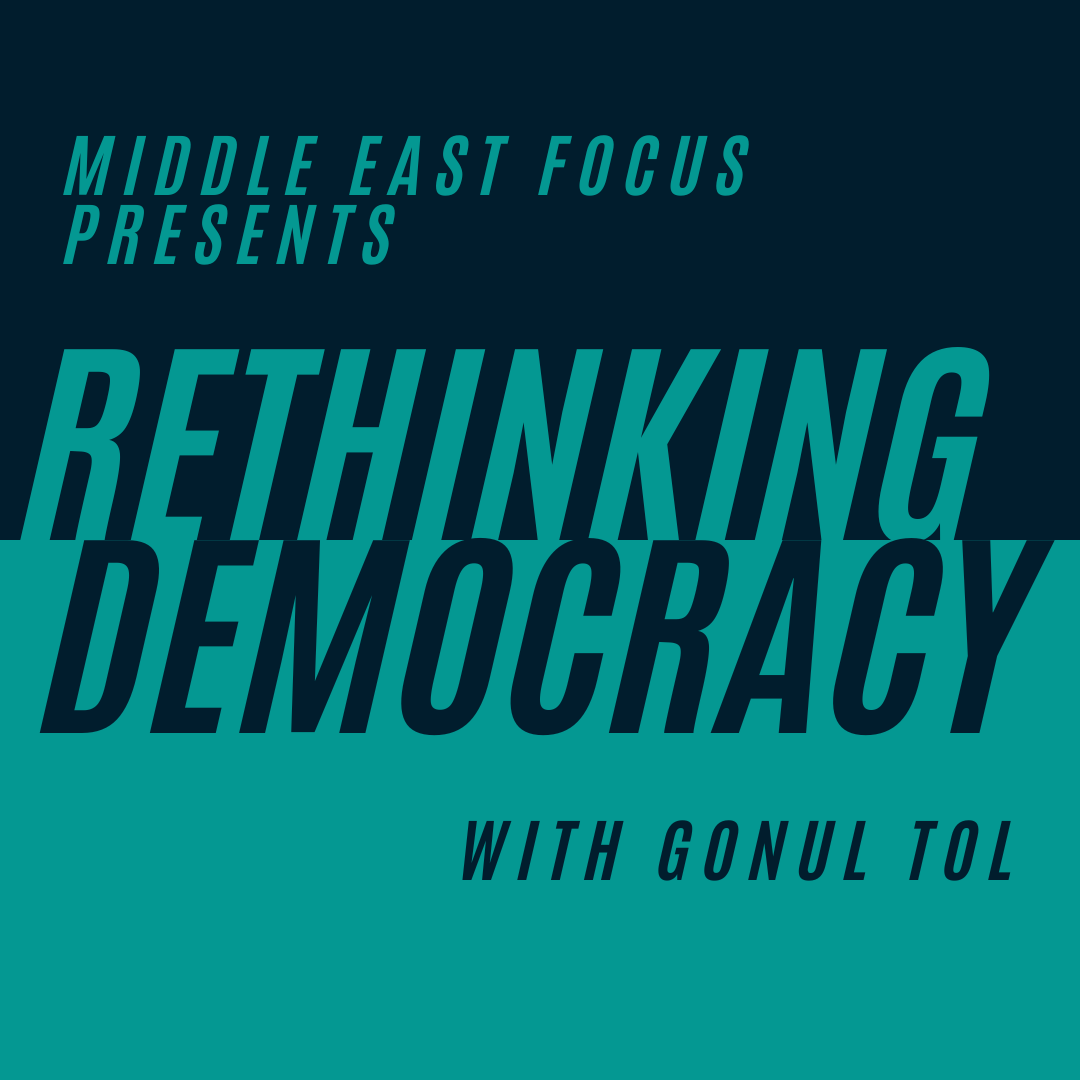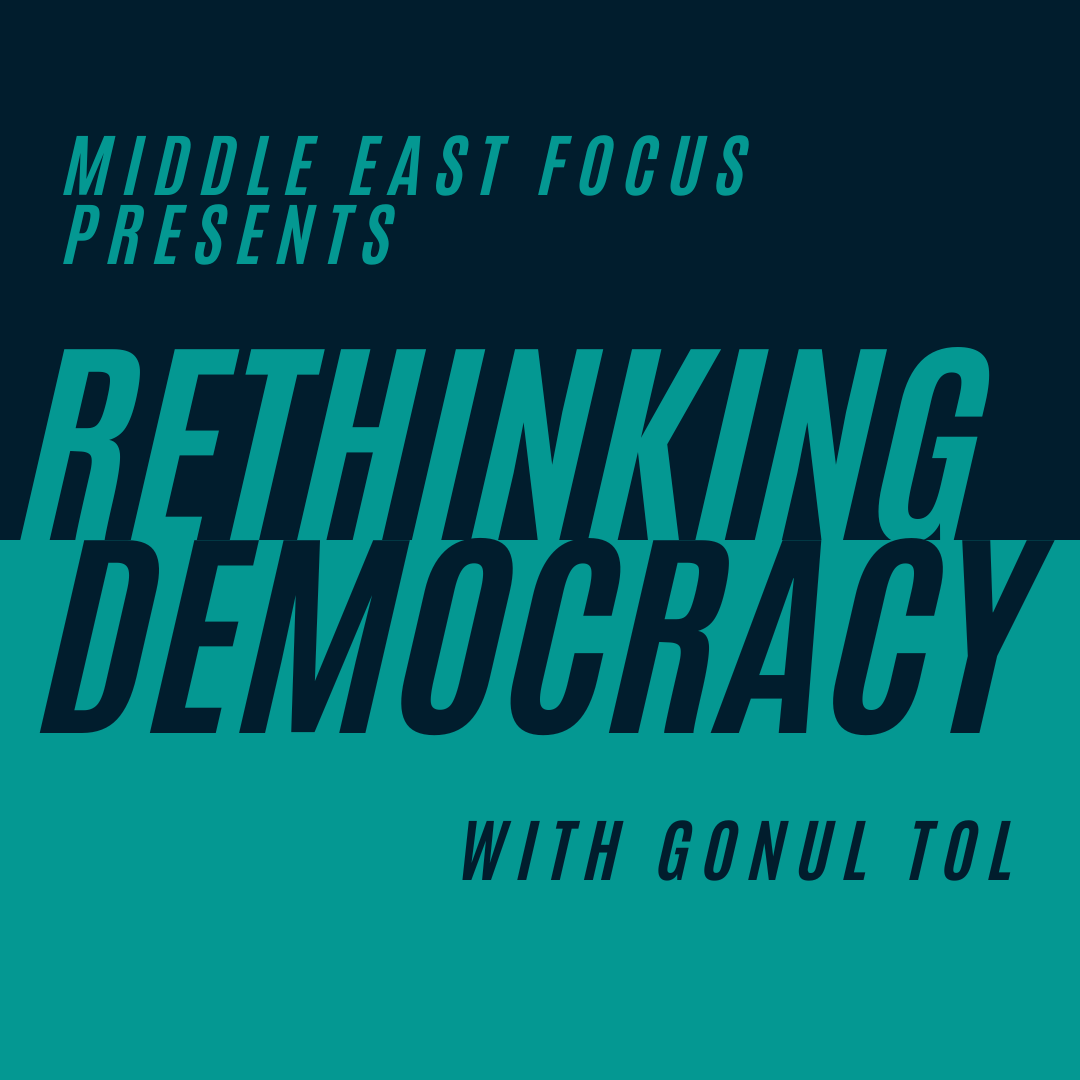Discover Rethinking Democracy
Rethinking Democracy

Rethinking Democracy
Author: Middle East Institute
Subscribed: 2Played: 11Subscribe
Share
© 2025
Description
This is a critical time for the future of democracy as citizens in America and across the globe are losing faith in democratic institutions. We often view the rollback of democracy and threats to the liberal international order as separate problems, but in reality they are closely interlinked. In this podcast series, MEI Senior Fellow Gonul Tol examines the interplay between democracy’s domestic and international foes as well as how to counter them.
11 Episodes
Reverse
Once hailed as a rare democracy in the Middle East, Lebanon has now slipped into the ranks of closed autocracies. Decades of corruption, sectarian rule, and foreign meddling have left the country reeling — and the past year brought assassinations, mass displacement, and Israel’s full-scale war against Hezbollah in the south. With its economy in free fall and its political system on life support, Lebanon stands at a crossroads: could shifts in regional power, efforts to disarm Hezbollah, and a change in leadership pave the way for recovery, or will instability deepen? Featured Guests: Randa Slim Senior Non-resident Fellow, Johns Hopkins University School of Advanced and International Studies (SAIS) Foreign Policy Institute Ayman Mahanna Executive Director, Samir Kassir Foundation (SKF)
Turkey’s main opposition, the CHP, is facing its toughest test yet: mass arrests, sham court rulings, and the ouster of key leaders—including Istanbul’s mayor Ekrem İmamoğlu, Erdoğan’s chief rival. With trials looming that could replace CHP leadership with government loyalists, the party warns of a legal ‘coup.’ What does this crackdown mean for Turkey’s fragile economy, its 2028 elections, and the future of democracy itself? We break it down in this episode of Rethinking Democracy with featured guests Selva Demiralp, Professor of Economics at Koç University, and Seda Demiralp, Assistant Professor of Politics and International Relations at Işık University. Recorded September 8, 2025
Could this be the beginning of a new chapter for Iran’s foreign policy—and for its pro-democracy movement? Gönül Tol speaks with Dr. Vali Nasr, one of the world's leading experts on the Middle East, to unpack the aftermath of the 12-Day War. Together, they examine the war’s domestic and regional fallout, the resilience of Iran's regime under fire, and the shifting public sentiment that may shape the country’s political future. Does survival alone count as success for Tehran? And what becomes of protest movements and democratic aspirations when a nation is consumed by existential external threats?
With Bashar al-Assad ousted and Syria entering a new political chapter, what comes next for a country ravaged by war, repression, and sectarian divisions? Gonul Tol speaks with Steven Heydemann (Smith College) and Radwan Ziadeh (Arab Center Washington DC) about the challenges of transitional justice, prospects for democratic reform, and the role of Syria’s new de facto leader, Ahmed al-Sharah. Can a centralized government model provide inclusive governance? What kind of support—or interference—should Syrians expect from foreign powers? And is the international community serious about democracy, or merely stability? Recorded June 12, 2025
The Kurdistan Workers’ Party (PKK) has announced it will disband and end its decades-long armed insurgency. Is this a turning point in Turkey’s century-long conflict with its Kurdish population—or a political maneuver to secure President Erdogan's grip on power? Gonul Tol is joined by Kurdish MP Ceylan Akca and political scientist Murat Somer to unpack the stakes of this historic shift, the demands for constitutional recognition, and whether peace is possible in a country where democracy itself is under threat.
President Donald Trump’s recent visit to Saudi Arabia, Qatar, and the UAE reignited debate over U.S. ties to authoritarian regimes. But the controversy underscores a deeper question: why has democracy struggled to take root in the Arab world? In this episode of Rethinking Democracy, host Gonul Tol sits down with Dr. Fawaz Gerges, Professor of International Relations at the London School of Economics and author of "The Great Betrayal: The Struggle for Freedom and Democracy in the Middle East," to unpack the cultural, structural, and geopolitical forces that continue to block democratization across the region.
Neoconservatives and MAGA isolationists are locked in a battle for the soul of Republican strategy. Nowhere is the split more glaring than over the Middle East: hawks view it as a proving ground for American power and allegiance to Israel, while isolationists see only endless wars that have bled America dry. Where does Trump fall in this tug-of-war? What are the real-world consequences of this struggle—for Ukraine’s survival, Gaza’s future, and the fate of nuclear diplomacy with Iran? In this episode, Gönül Tol speaks with Bill Kristol—founding director of Defending Democracy Together and editor-at-large at The Bulwark—to unpack the ideological realignment underway in US foreign policy. Recorded April 25, 2025
Ukraine faces a pivotal year in its fight against Russian aggression — and for its democratic future. With fears mounting that President Trump could abandon peace talks with Kyiv and Moscow, the risk grows that US disengagement could tip the balance toward Russia and fracture the global democratic order. Is Ukraine’s resistance a last stand for democratic values in Europe? How should the democratic world respond as political will in Washington fades? In this episode of Rethinking Democracy, host Gönül Tol is joined by Ivan Krastev, permanent fellow at the Institute for Human Sciences in Vienna, and Yaroslav Trofimov, chief foreign affairs correspondent for The Wall Street Journal, to explore what Ukraine’s struggle reveals about the resilience — and fragility — of democracy worldwide. Episode recorded April 16, 2025.
Turkey has plunged into turmoil after authorities arrested Istanbul Mayor Ekrem İmamoğlu, President Erdoğan's strongest opponent, on charges of corruption. Mass protests, the largest in over a decade, have erupted nationwide after İmamoğlu was removed from office and jailed just hours before the opposition was set to declare him its presidential candidate. Political scientists warn this is a defining moment for the future of democracy in the country. Is it indeed a turning point? How did we get here and where do we go next? In this episode of Rethinking Democracy, experts break down Turkey's latest turmoil and what it means for the country's democratic future and democracy worldwide. Dr. Karabekir Akkoyunlu, research associate at the Department of Politics and International Studies at SOAS University of London, and Dr. Senem Aydın Düzgit, professor of International Relations at the Faculty of Arts and Social Sciences at Sabancı University in Istanbul, join host Gönül Tol to explore the challenges and possibilities that lie ahead for Turkey. Episode recorded March 28, 2025
For the first time in decades, the question of how Syria will be governed is wide open. The fall of Bashar al-Assad’s regime at the hands of Hayat Tahrir al-Sham, an armed Islamist group with former ties to al-Qaeda, has left Syria in uncharted territory. Its de facto leader, Ahmed Al Shaara, has pledged a vision of a pluralistic Syria governed by civil institutions rather than dictatorship or ideology. But can Syria’s new rulers deliver on that promise? Will this moment mark the beginning of an inclusive, secular democracy, or will Islamist rule take hold? And can Syria’s fractured society—divided by years of war and sectarian tensions—unite around a new national identity? Dr. Olivier Roy, Professor of Political Science at the European University Institute, and Ziad Majed, Professor of International Relations at the American University of Paris, join host Gonul Tol to explore the challenges and possibilities that lie ahead for Syria.
Last month, the US electorate voted President-Elect Donald Trump back into the White House. His victory was seen by some experts as part of a global trend and a move towards anti-incumbency attitudes and populism. How will Trump’s rhetoric impact the United States domestically and internationally? Will he govern as a strongman during his second term? What can we expect to be different from his first term? Dr. Larry Diamond, Mosbacher Senior Fellow of Global Democracy at the Freeman Spogli Institute for International Studies at Stanford University and author of Ill Winds: Saving Democracy from Russian Rage, Chinese Ambition, and American Complacency, and Ruth Ben-Ghiat, Professor of History and Italian Studies at New York University and author of Strongmen: Mussolini to the Present, join host Gonul Tol to discuss Trump’s election.







